For the first time in three years, SIANI organised its annual meeting in physical form. On the 9th of March, over 50 partners and members travelled to Stockholm from many parts of Sweden and abroad to attend the meeting, coming from various disciplines and sectors in food systems. The purpose of the meeting was to bring together SIANI members, discuss ways in which we can contribute to shaping the dialogue around rights-based and sustainable food systems, and launch the new phase of SIANI. This year, the focus was particularly on the transformation of our food systems into more resilient and inclusive in times of recurring crises, and how SIANI as a network can come together and assist in doing this.
Transforming food systems in times of recurring crises
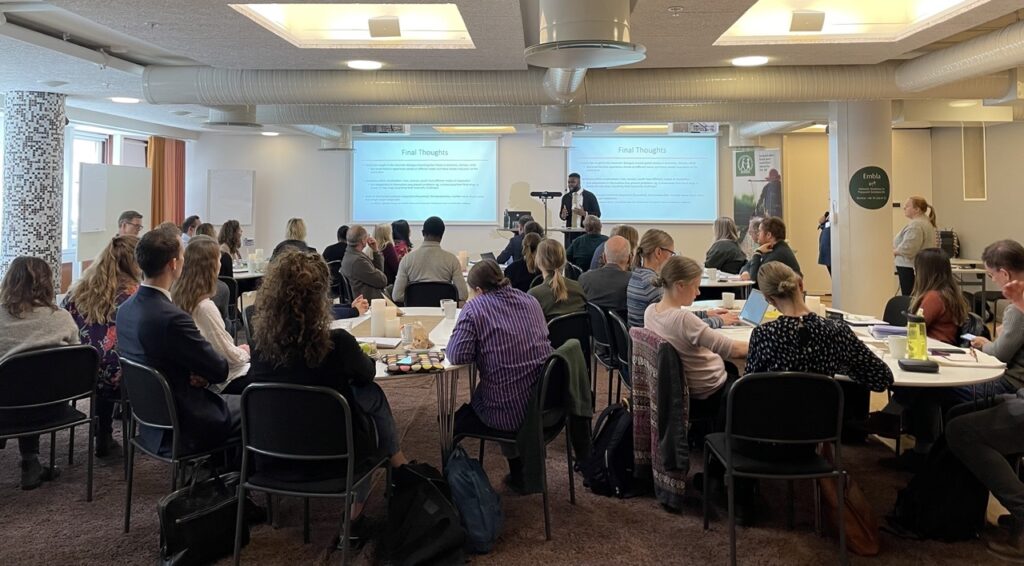
SIANI annual meeting 2023. Photo by Marta Anguera.
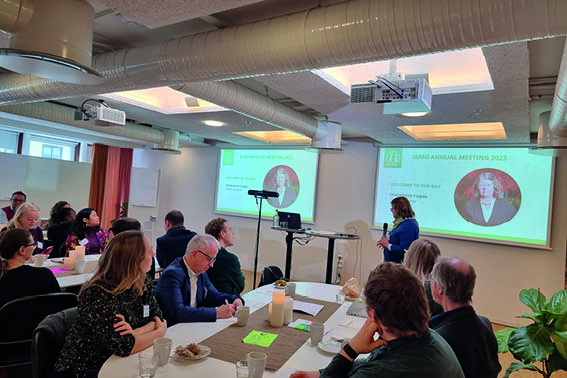
SIANI Program Director Madeleine Fogde initiated the meeting.
The day began with introductory words from the SIANI Program Director Madeleine Fogde. Madeleine described the consequences of the pandemic, the war in Ukraine, climate change, resource depletion, and biodiversity losses, and the immense impacts which these have had on SIANI and partner organisations. While these crises bring challenges, they also provide opportunities for further collaboration across organisations, sectors, and countries.
“This is a very important network because we connect with a lot of people. We are working towards Agenda 2030 and focused on SDG goal number 2 – Zero Hunger. And we can only do it together, by understanding and learning from each other. That is why we are here,”
said Madeleine, emphasising the importance of SIANI’s network and arranging meetings like this to convene the different partners in working towards the common goal.
To introduce participants and open the meeting, an interactive Mentimeter gave a geographic outline of the attending participants’ partnerships and collaborations, indicating the outreach of SIANI. It illustrates SIANI and its network’s presence globally – particularly in Sub-Saharan Africa.
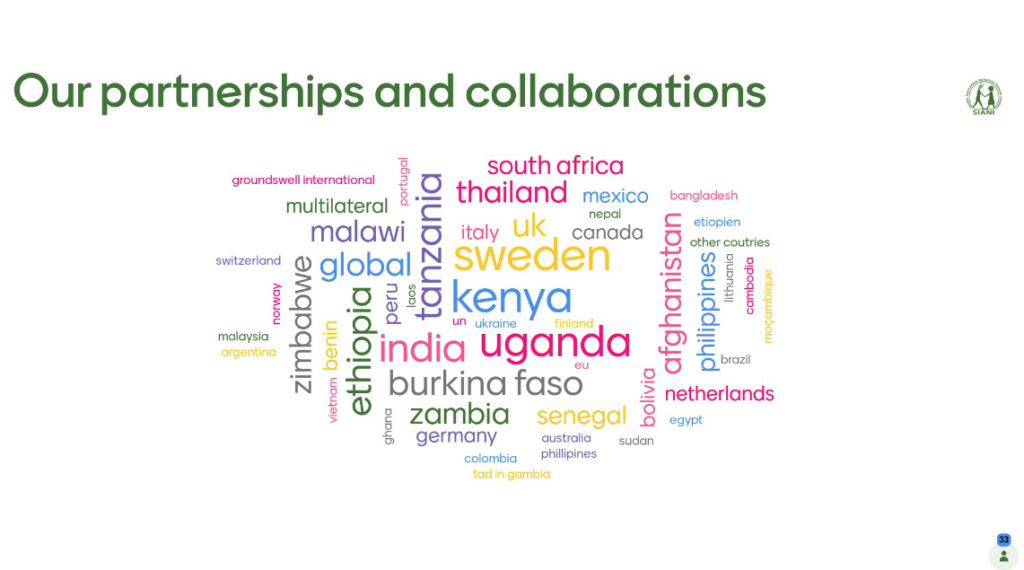
The geographical location of the participants’ partners and collaborators during the SIANI Annual Meeting 2023. The bigger the country’s name, the more people entered that they have partnerships in that country.
Photo: Screenshot from the Mentimeter created with menti.com
Creating a Resilient and Inclusive Food System in Times of Recurring Crises
During the morning session, speakers from diverse sectors, including research and academia, civil society, and the private sector, shared their work and thoughts on resilient food systems in times of crises. The session brought new perspectives on food systems transformation and the challenges we are facing, which also provide opportunities for improvement.
Dr. Caroline Delgado, Senior Researcher and Director of the Food, Peace and Security Programme at SIPRI, initiated the presentations by sharing her knowledge on war, food insecurity, and hunger.
Dr. Selorm Kugbega, Researcher at AgriFoSe and SEI, continued by presenting his reflections and lessons learned from fieldwork in Ghana on the topic of how global crises affect smallholders and SMEs.
Likewise, concerning local resilience and a more inclusive approach, Malin Flemström, who is the Vd/Country Director of The Hunger Project Sweden, spoke about how communities can mobilise and be resilient in times of crises.
Through exemplifying action taken at the local level, Ana Pérez Aponte, Development Director at Inclusive Business Sweden, illustrated progress in the field with a case study from Ethiopia concerning how food systems in the country are being reshaped by innovative food companies.
Mats Åberg, Senior Policy Specialist at Sida, finished off the speaker session by zooming out and discussing the crucial linkages between humanitarian aid and development cooperation.
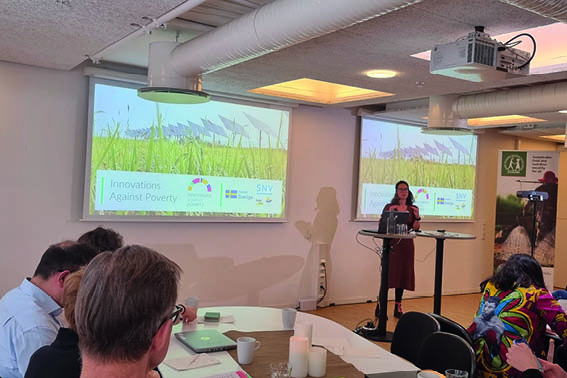
Presentation by Ana Pérez Aponte, Development Director at Inclusive Business Sweden.
The Role of the SIANI Network in Food System Transformation in Times of Crises
To bring forth ideas on how SIANI and partners can work together to achieve sustainable food systems transformation, all participants at the meeting were invited to take part in round table discussions to share their own thoughts and insights. The main question discussed was: “What role can the SIANI network play in the transformation of food systems in times of crises and how can your organisation contribute?”.
The participants came up with many great ideas, stressing the network’s role of facilitating dialogue, bringing people together, and enabling collaboration. The role of the network can also be to work effectively with communication in order to raise topics that are not heard elsewhere – the diversity of the network in terms of sectors and collaborations around the world is an important asset in this attempt. A mapping of members’ expertise, living labs, a bottom-up approach, and pilot multistakeholder projects were some of the concrete ideas the participants put forward. Through such activities, SIANI should try to be bold and impactful.
If you want to see all the ideas in detail, you can find the compiled summary here.
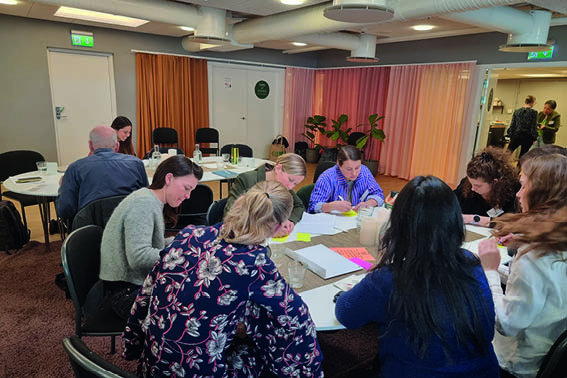
Round Table Dialogues were conducted to bring forth ideas on how SIANI and partners can work together to achieve sustainable food systems transformation.
The afternoon session continued with a presentation by Alice Tunfjord, Associate at SIANI/SEI, on the new vision of SIANI going forward.
To illustrate these broad interactions, network, and benefits of being part of a network, within SIANI and beyond, a panel discussion was held with representatives from SIANI partners on how we can make good interactions, and what these forms of interaction would entail. It also explored the type of thematic areas and topics that might be important in upcoming years and how we can come together to amplify these and share knowledge around new issues on the agenda. The three panellists were Bo Lager, Senior Policy Advisor in Agriculture at The Swedish Society for Nature Conservation, Mats Hårsmar, Deputy Managing Director at the Expert Group for Aid Studies, and Linda Andersson, Director of Communications at Axfoundation.
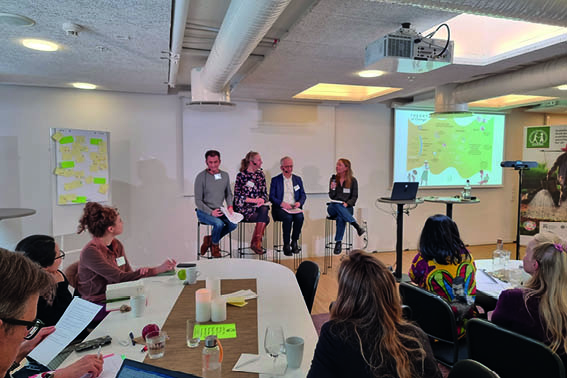
Moderator Alice Tunfjord, Associate at SIANI/SEI and the three guest panellists Bo Lager, Senior Policy Advisor in Agriculture at The Swedish Society for Nature Conservation, Mats Hårsmar, Deputy Managing Director at the Expert Group for Aid Studies, and Linda Andersson, Director of Communications at Axfoundation.
The meeting carried on with announcing the new call for SIANI Expert Groups, and illustrated a successful case through the Expert Grop on Agrobiodiversity in Nepal led by Dr. Santosh Shrestha, from Local Initiatives for Biodiversity, Research and Development (LI-BIRD). He sent virtual greetings from Nepal and presented their work and results.
The Way Forward Towards Transformation and Change
The day was concluded with closing remarks from SIANIs Chair of the Steering Committee Cecilia Nordin Van Gansberghe, as well as a final Mentimeter concerning what the participants found were the most impactful outcomes of the meeting. On the Mentimeter, there was general agreement on the valuable significance of the meeting being back to physical format, which facilitated new linkages, contacts, connections, and networking. There was consensus on it instigating inspiration, demonstrating the complexities of the challenges we are facing, and highlighting the importance of building and establishing trust, partnerships, cooperation, and collaboration. Furthermore, that there is a need for increasing and broadening knowledge, incorporating all actors – including the private sector – with a locally integrated, bottom-up approach.
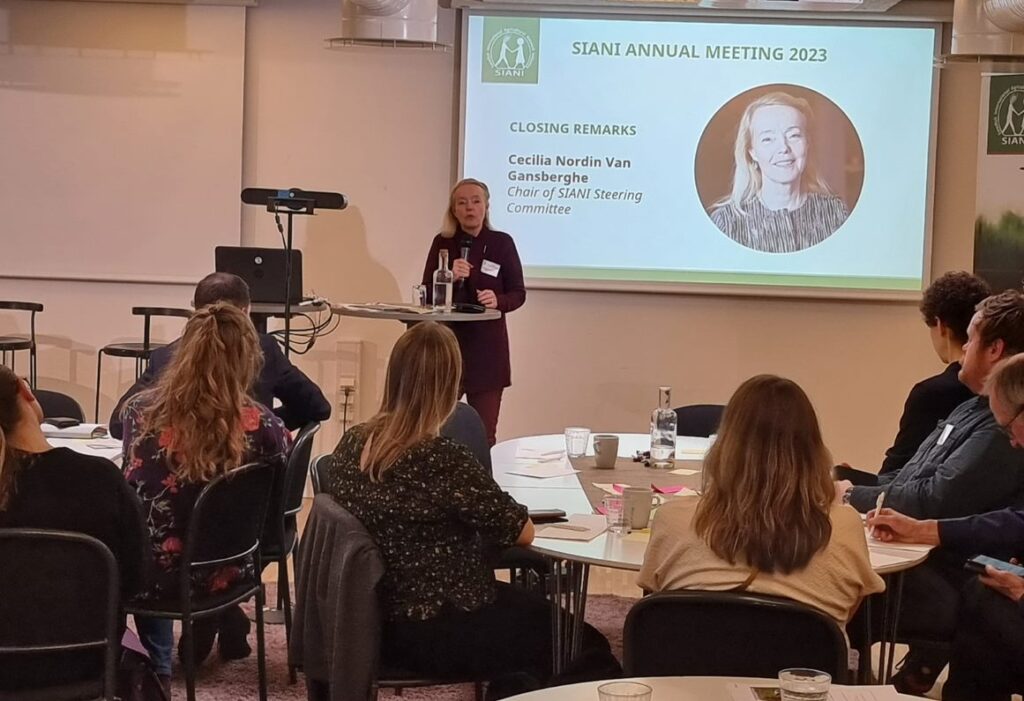
Cecilia ended the meeting by stressing that the important role of SIANI as an area and platform for networking. She stressed the complexity of resolving the issues raised during the meeting and the role of trust and social inclusion. Cecilia concluded by stating:
“At times we can all feel despair because we feel like what we are doing is very small, but it will slot into all these other people that do the same things globally. The future is built by many different people, doing many different things, in many different areas. You are candles that can actually inflame the passion for renewing food systems, making them resilient.”
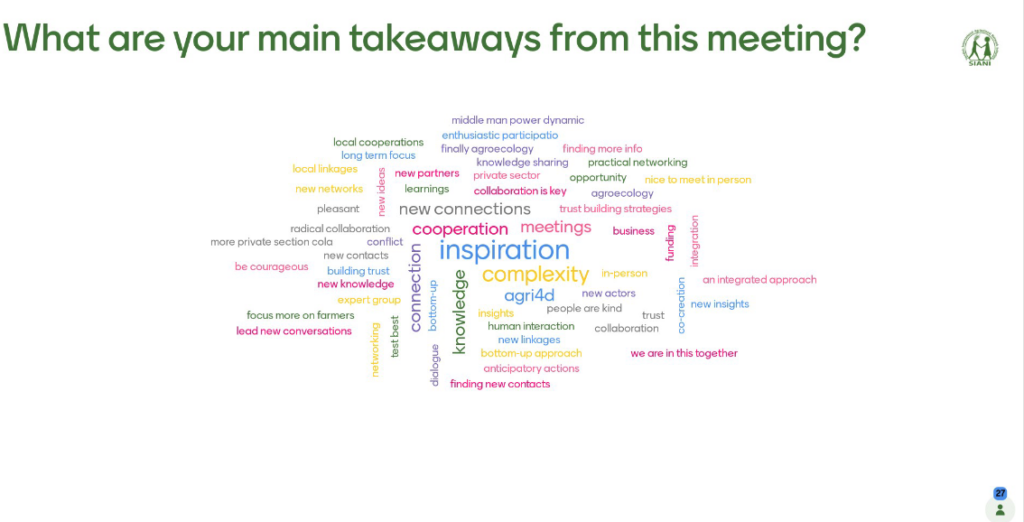
Participants’ thoughts on what they found were the most impactful outcomes of the SIANI Annual Meeting 2023. The bigger the word, the more people wrote it down as a takeaway.
Photo: Screenshot from the Mentimeter created with menti.com
If you missed out on the opportunity to attend this annual meeting physically, there will be a virtual meeting held for international members later this spring. Stay updated on the SIANI website to make sure you reserve a spot to join this event.
Authors
Related content
28 March 2023
News Story
Food Systems
9 March 2023
News Story
Food Systems
Past event